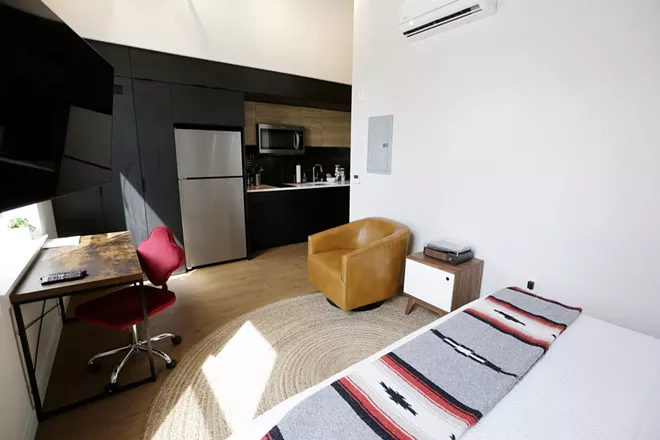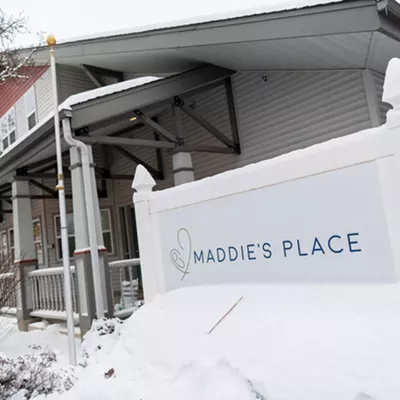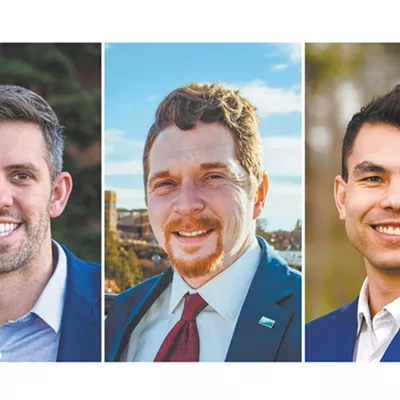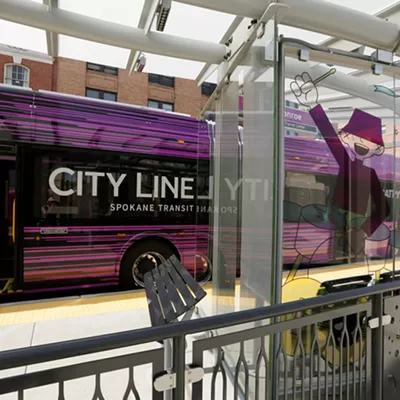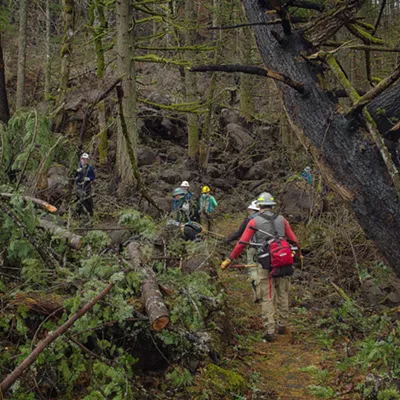
Nobody's surprised that Spokane's hotel owners aren't particularly fond of the Airbnb rooms they compete with.
"The hotels are like, 'Hey you're undercutting us,'" says City Council President Breean Beggs, "They're the ones that pushed for no short-term rentals downtown. They feel that they compete with them downtown.'"
With Spokane's housing crisis at a peak, the idea that housing units that could be rented are, instead, being turned into ad-hoc hotel rooms can be a tough sell.
"Nobody likes permanent housing being put to short-term use when there's such a significant crisis," says Spokane Planning Director Spencer Gardner.
On the other hand, he says, there are also families who may rely on an extra source of income from renting out a bedroom. Places like Chelan County, Gardner says, have banned new Airbnbs entirely. Now, the city and some members of City Council are brainstorming potential ideas to tweak Spokane's own short-term rental ordinance.
Beggs floats one idea he thinks might limit big corporate Airbnbs without sabotaging small-time homeowners renting out their rooms.
"Units would be limited everywhere to no more than two units by any one owner to no more than two units in any one building," Beggs says.
On top of that, he says, the city could also consider charging an additional $15 fee for each unit each night it's rented.
"That money would go into a fund to create affordable housing since these units are taking away affordable housing," Beggs says.
But it's tricky to know exactly how Spokane's short-term rentals are impacting the housing market when it's not always clear how many short-term rentals there actually are.
Take the city's permitting data for officially permitted Airbnbs — or other less-than-30-day short-term rental properties — and plop it down on the city map, and you'll notice two things right away.
First: There are hardly any Airbnbs properties recorded in that city database. The official records show fewer than 200 different Spokane addresses, though some addresses may offer more than just one bedroom up for rent. Second: There's a huge hole in the center of the map.
Right now, as it stands, the city's records only show a single short-term rental in all of downtown. And considering that one lists Spokane's City Hall as its address — and it's highly unlikely that the mayor has, say, converted some empty cubicle space in the finance division to help the city make a little extra cash — that one's probably a mistake.
By contrast, pull up AirDNA, a short-term rental tracking site, and there were over 811 active short-term rental listings as of last week, including a slew downtown.
Back in 2015, the city had spent nearly a year developing and debating the current regulations that legalized Airbnb units. But today, it looks like only about a quarter of Airbnbs identified in the city have been following the rules. The issue hasn't just been the rules, it's how they've been refereed.
"I'm proposing that we actually start using better enforcement," Beggs says.
If it's true that there are around 800 units of short-term rentals in Spokane, that's less than 1 percent of the approximately 90,000 rental units in Spokane, Gardner points out. Compare that with, say, San Juan County, which the Seattle Times reported had turned 7 percent of its housing stock into short-term rentals by the time the county introduced reforms in 2018.
But Spokane City Council member Lori Kinnear, who helped design the city's 2015 Airbnb ordinance as a legislative aide, puts Spokane's number in another perspective.
"We have almost 800 Airbnbs around," she says. "Almost the same number of homeless in our city."
Dan Gookin, a Coeur d'Alene city councilman, says his city has had to grapple with a similar challenge.
"I worked to try to get them to be permitted as a legal business, but also regulated," Gookin says, "Well, we got them permitted, but we didn't get them regulated."
Gookin says only about a third of the approximately 600 units operating in Coeur d'Alene are licensed and in compliance with the city's ordinance.
"There was one guy who moved away, and he commented that every other house on his street was a short-term rental. He had no idea who his neighbors were," Gookin says. "People that invest in a neighborhood want to be in the neighborhood and have that neighborhood remain consistent."
But Trevor Cressey, an Airbnb operator in Spokane, argues that locally owned short-term rentals are an important part of the local ecosystem, too.
"Spokane has done a really good job of investing in things like new sports complexes and bringing in outside tourism and sports events for the city," Cressey says. "We need the tourism and the travel to support the economy as much as we need housing."
Cressey's 10 short-term rentals do show up in the city's list. After all, Cressey says he's diligent about making sure his properties are officially licensed with the city.
"When I started doing this business, I knew I was going to do everything correctly," Cressey says. "It has slowed me down compared to other investors."
Yet his experience makes it clear why so many people don't bother. The problem isn't the fee — $150 upfront, and $100 to renew — or the lodging taxes. The problem is everything else with the short-term permit process the council approved back in 2015.
"It's a little clunky," Cressey says.
Operators in Spokane are required to submit parking plans, floor plans, fire safety plans and site plans. They need to submit a city business license and proof of insurance. They're required to send out a letter to all the next-door neighbors of each of their Airbnb properties alerting them to the property's use.
And then there's the information he has to keep on guests. For every guest who stays at any of their properties, operators are required to keep booking records of the names and home addresses of each guest, each guest's license plate numbers, and which guest stayed in which room. Add it all up, and it's a lot of work.
"If there was a better online portal, that would help tremendously," Cressey says.
On the other hand, the Airbnb operators who just decide to ignore these rules can usually get away with it.
"There just haven't been the complaints about the activity that has generated the enforcement response," Gardner says.
Beggs argues the city should stop simply relying on complaints and start being proactive. There are companies, he says, that not only track the number of current Airbnbs listed online, they tell you which addresses they're offering. But first the city has to purchase that service, Beggs says.
"They've been promising to get us the service that will tell us the specifics for well over a year," Beggs says.
Local developer Jordan Tampien didn't make a secret of his intention to turn units in two of his downtown apartment complexes — the Roxy and the Parkview — into short-term rentals. When COVID hit, Parkview had just been completed, and Roxy was in the middle of construction. The projected costs to make their projects pencil skyrocketed.
"We had to start moving studio rentals, to like $1,400," Tampien says.
Not only that, but the lockdown made it impossible to take potential tenants or their agents on in-person tours to get revenue. But that was only for apartment units.
"There weren't any limitations on Airbnbs," Tampien says. Regulations, he says, allowed Airbnb tenants to access units with remote entries, even during the height of the COVID lockdown. So in both complexes, he changed a slew of different units to short-term rentals.
But when the Inlander spoke to Beggs and Gardner, they initially insisted Airbnbs were currently illegal in downtown Spokane under the city's code.
"That's part of the problem. We know that they're operating, it's like we're almost unable to enforce it because of the sheer volume of the units," Gardner told us. "Part of the conversation has been, can we bring these downtown zones into compliance by allowing them and giving them basically a pathway to legitimacy?"
But Tampien insists that, actually, the city has previously made it clear that there was no problem with short-term rentals like Airbnbs downtown.
"I was told two years ago, they were permitted in the commercial zone," Tampien's attorney, Mack Mayo says.
On top of that, Tampien said he told the city he was turning some of his units into short-term rentals as part of his conversations about the projects' multifamily housing tax exemptions. But his attorney, Mayo, recalls struggling to figure out exactly how the city's code regulated the apartments downtown.
"I remember spending a ton of time, trying to comply," Mayo says. "I remember being fed up,"
Finally, he says, he called the city and asked directly. He says a woman at the city walked him through the nuances — that downtown properties weren't regulated under the Airbnb ordinance. In commercial zones like downtown, Airbnbs can be legally built if they're treated as either a hotel or as "retail sales and services," giving Tampien's project a different path, outside of the city's framework for residential short-term rentals, to legality.
The Inlander pressed the city for a verdict: Who was right? Who was wrong? Finally, city spokesman Brian Coddington forwarded a clarification that explained that almost everyone was wrong. In fact, Airbnbs were allowed downtown, as Mayo and Tampien said. But since their two buildings were categorized as "residential" buildings, not retail sales or services, Tampien's Airbnbs still weren't complying with the city code. According to the city, fixing that issue probably won't be difficult, and Tampien has said he's committed to getting it right.
Beyond highlighting what a confusing mess the process is, Tampien's case is instructive in another way: If Airbnbs are too restricted, it's possible some apartment projects could be delayed longer or not get built at all.
Gardner, the planning director, is well aware of that.
"If you're overly restrictive, then you could actually end up being counterproductive," Gardner says, "because you might be killing projects that could otherwise go ahead if they were able to use that short-term rental income to make it work."
And as the city seeks to come up with a new standard, Tampien and Mayo say they want to be a part of that conversation.
"Whatever that is, we're going to comply with," Mayo says. "We've been trying to do that the whole time." ♦

